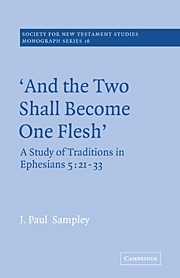Book contents
- Frontmatter
- Contents
- Dedication
- Preface
- Acknowledgments
- I Introduction of problem and perspective
- II Outline of the epistle to the Ephesians and the author's knowledge of his readers
- III Identification and study of traditional materials in 5: 21–33
- IV Three passages from the homologoumena especially related to 5: 21–33
- V Hermeneutical problems in 5: 31–2
- VI The movement of thought in 5: 21–33
- VII Detailed analysis of 5: 21–33
- VIII Concluding observations
- Bibliography
- Indexes (passages cited, authors, subjects, selected Greek words)
VI - The movement of thought in 5: 21–33
Published online by Cambridge University Press: 29 September 2009
- Frontmatter
- Contents
- Dedication
- Preface
- Acknowledgments
- I Introduction of problem and perspective
- II Outline of the epistle to the Ephesians and the author's knowledge of his readers
- III Identification and study of traditional materials in 5: 21–33
- IV Three passages from the homologoumena especially related to 5: 21–33
- V Hermeneutical problems in 5: 31–2
- VI The movement of thought in 5: 21–33
- VII Detailed analysis of 5: 21–33
- VIII Concluding observations
- Bibliography
- Indexes (passages cited, authors, subjects, selected Greek words)
Summary
Former treatments of Eph. 5: 21–33 have overlooked or under-estimated the importance of the train of thought in the passage. Even studies of 5: 21–33 as important as Schlier's do not treat the movement of thought, but focus exclusively on other problems such as the hieros gamos.
Since this investigation has shown that 5: 21–33 must be considered as a literary unit, any effort to set forth the train of thought must reflect that unity. Such a clarification of the movement of thought should provide a framework in which to see further relatedness of the diverse traditions within 5: 21–33.
On the basis of subject-matter alone, it is possible to separate those parts of 5: 21–33 most directly concerned with husband and wife on the one hand from those parts most specifically related to Christ and the church on the other hand. This separation is not to be considered distinction, since there is a definite interplay and relatedness that will be examined later. Apart from judgments made on the basis of subject-matter, there is also grammatical corroboration for such a separation. Comparative particles such as ὡς, οὓτως, and καθώς as well as the somewhat adversative conjunction πλήν provide a grammatical basis for confirming the separation suspected on the basis of an analysis of the subject-matter.
- Type
- Chapter
- Information
- 'And The Two Shall Become One Flesh'A Study of Traditions in Ephesians 5: 21-33, pp. 103 - 108Publisher: Cambridge University PressPrint publication year: 1971



